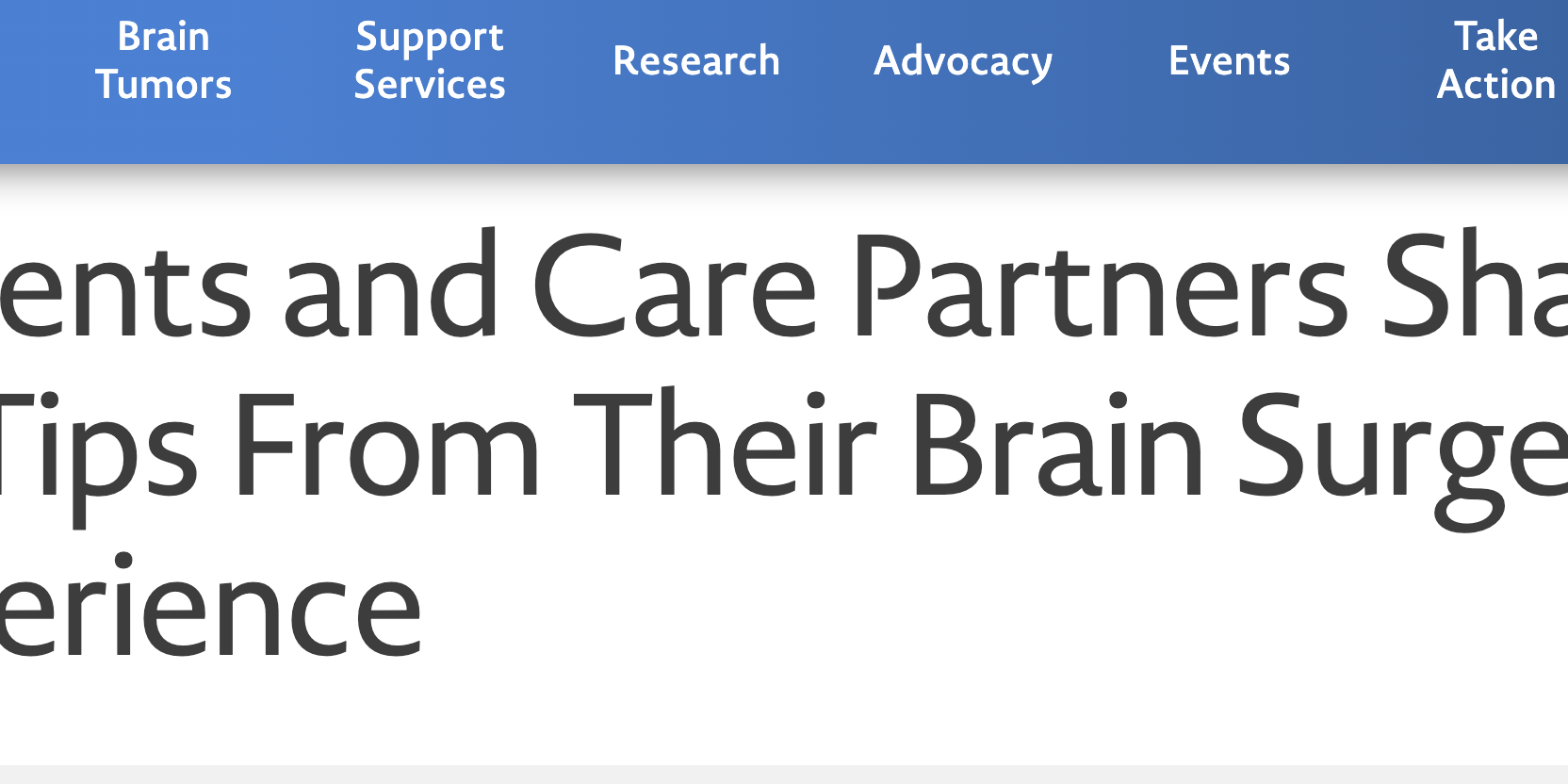LATEST NEWS
What to expect when you’re undergoing brain surgery.
NEWS October 2023
The National Brain Tumor Society has good tips on what to expect when having brain surgery, including tips for care partners. People who receive a glioblastoma diagnosis are usually completely shocked and not prepared, this information may help.
“Tips to Consider Before Surgery
1. Designate a point person to manage communication with loved ones about the surgery.
“It was really helpful in my case to have my partner be the quarterback for communication,” Dace H. said. ”Set up some rules and some plans ahead of time.”
- Your point person can post an update to a specific social media account or a CaringBridge page or send a mass text through a group texting service (additional fee).
- Does your hospital allow visitors for patients having your surgery? If so, how many visitors can you have? Do you want to have visitors? Share your preferences with your designated contact so they can inform people who ask. “For me, being able to see my friends and family after the surgery was so important,” said Taylor G., who has glioblastoma. Others may prioritize privacy during the recovery period.
2. Determine a point person to navigate requests to help after surgery.
People may ask what they can do to help after your surgery, such as dropping off a meal. Ask a friend or family member to help you organize those requests. There are free online tools that can be used to help coordinate care as well.
“Pick someone to direct people to who can coordinate all of that for you so your fridge isn’t full of food one week and empty the next,” said Liz P., whose husband Julio has had two craniotomies. “Let them know if you have dietary restrictions. If you are traveling for surgery, give some gift card options for places nearby. I also found an Amazon wish list to be helpful last year when things were bumpy. I put some of Julio’s favorite snacks on there, plus some home physical therapy tools, supplements, etc.”
There are other ways family and friends can help in addition to providing food to the patient and care partner.
“I had friends and family that pitched in to take care of our yard, provide cleaning services, and drop food off post-discharge,” Taylor said.
3. Pack a few amenities from home.
A soft robe, nightgown, pajamas (should button up front), and a cozy blanket can help you feel more comfortable in the hospital room. Regarding technology, consider bringing a long cord charger for your phone, a tablet, and wireless earbuds. Depending on how you feel after surgery, you may not use technology, but it’s nice to have it available should you feel up for it.
If you use contacts and/or glasses, bring those with you. You will not be able to wear contacts during surgery. For individuals with poor vision, you can request that your glasses go with your personal effects to be available once you’re awake. Bringing your toothpaste, toothbrush, lip balm, pillow, and towel can help make you more at ease.
“I didn’t know I wasn’t going to be able to breathe through my nose after my transsphenoidal surgery,” said Gabe R., who was diagnosed with craniopharyngioma and has undergone two surgeries. “Because I had to breathe through my mouth, my lips were so chapped. My mouth would get so dry that I constantly had to drink water. No one told me I needed chapstick and how much that would have helped me.”
4. If you have concerns about your hair, talk to your neurosurgeon.
Whether your hair will be cut depends on the surgeon and their approach. Unless explicitly stated in your pre-op instructions, you do not need to cut your hair or shave part of your head before surgery.
Stacy Pietrafitta, a neuro ICU nurse and a grade 3 astrocytoma survivor, suggests, “There is no shame in asking, ‘Doctor, what approach are you taking? I want to know how I can save my hair, and I want to get my hair ready. I’d like to braid it or put it to the side. Let me know what I can do.’”
5. Let nothing go unsaid with loved ones before surgery.
Whether you want to tell a friend or family member what they mean to you or share the emotions you’re feeling about the procedure, speak up.
“Never did I hear the words, ‘I love you,’ so much until I got diagnosed with a brain tumor, and I had to have surgery,” shared Kayla S., an acoustic neuroma survivor and a neuro ICU nurse. “I tell people all the time that now is not the time to withhold it. Don’t let anything go unsaid prior to surgery.”
6. Understand that recovery will be a process.
While there may be similarities in how patients recover from brain surgery, each individual will respond differently. Kayla encourages you to ask your neurosurgeon about your possible outcomes after your operation and have a mindset that your recovery will be a process.
“After surgery, when patients come out, there is a lot of self-doubt when they realize what a long road ahead they have,” Kayla said. “You don’t feel like you. I tell patients that the recovery process starts on day one. When they wake up, I say today is your day to recover. But tomorrow, stretch, fall, stay with it, and stay consistent. Believe in yourself because there’s just too much doubt in everything, and the grief can hold you back from believing what you’re capable of.”
Similarly, understand that you may stay in the hospital for 3–10 days, depending on individual circumstances.
“Prepare that if everything goes smoothly, your loved one might be released from the hospital after a couple of days,” Liz said. “Julio ended up not needing physical rehab after the first surgery and was released two days after his craniotomy. The second time, I think it was 3-4 days.”
7. Determine your health care proxy and communicate your wishes to that individual.
Before surgery, complete your advance directive forms, including signing a form indicating who your health care proxy will be, to ensure your wishes for medical care are respected and followed. In addition to completing the paperwork, it’s also important to talk to your health care proxy about your wishes. Unsure of where to start? Review NBTS’s key questions to consider when starting this process. You can then share your responses with your health care proxy to help guide their decision making.
“For any surgery or even without surgery, I think it’s important to know what your loved one’s wishes are if things don’t go as planned,” Liz shared. “If they can’t speak for themselves, you want to know what to say for them, and you also want to have documentation saying you have the authority to make decisions. This could be literally being unable to speak — as we’ve had before — or prolonged loss of consciousness.”





